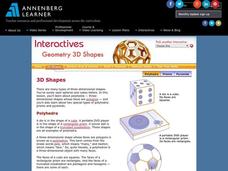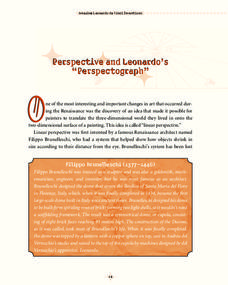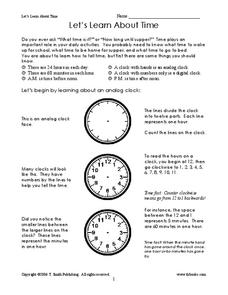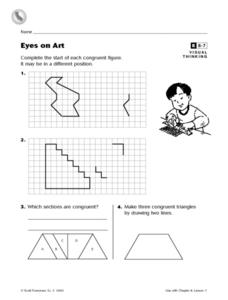Curated OER
Principle of Art Balance
Reinforce a strong art vocabulary which can also apply to aspects of math and science. Kids read about various types of balance or symmetry found in art. They analyze three paintings based on vocabulary and read a how-to for creating...
Dick Blick Art Materials
Start with a Circle...
The Golden Ratio. The Divine Proportion. Yup. It's math and art blended into one colorful activity. Young artists combine colored tissue paper circles and parts of circles to create geometric patterns. As a bonus, kids get to figure out...
Curated OER
Identifying Patterns
What's the pattern? Youngsters examine four sets of sequential images to detect a pattern and continue it onto a fourth image. Ask them to verbalize what they noticed and how they continued this pattern. Consider extending the concept...
24x7 Digital
TeachMe: 1st Grade
Let your eager learners practice their basic arithmetic and spelling skills with this fun interactive resource! For any primary grade teacher with access to an Apple mobile device, this is a must-have application.
Intel
Choreographing Math
Leaners investigate families of linear functions through dance. They choreograph dance moves to model nine unique linear functions of their choosing. Using their dance moves, teams create a video presentation complete with music and...
Annenberg Foundation
Geometry 3D Shapes: 3D Shapes
Explore vocabulary related to three-dimensional shapes. An instructional website describes the characteristics of different geometric solids. Learners can use an interactive component to view nets, faces, vertices, and edges of common...
The New York Times
Perspective and Leonardo’s “Perspectograph”
Filippo Brunelleschi's invention of linear perspective during the Renaissance was further developed by his apprentice, a young artist named Leonardo da Vinci. Now modern artists can give da Vinci's famous perspectograph a try...
Annenberg Foundation
Geometry 3D Shapes: Euler's Theorem
How do you get a theorem named after you? Euler knows what it takes! The third lesson of five asks pupils to use an interactive activity to compare the faces, vertices, and edges of seven different three-dimensional solids. They use...
Curated OER
Let's Learn About Time
Learning to read an analog clock is not a lost art! Use these worksheets as you introduce youngsters to telling time. Because much of this packet is informational and includes a lot of text, this may be intended for older students....
Curated OER
Identifying Patterns
What's the pattern? Beginners with this skill examine four sets of objects to determine a pattern, continuing it by drawing the rest of the objects in the space provided. Next, they do the same but with two numeric patterns. These don't...
Curated OER
Identifying the Patterns
What pattern do you see? Preschoolers examine four visual patterns and complete them after observing the repeating designs. Then, they create two patterns of their own. Because these are all drawn into circles, consider extending this to...
Curated OER
Eyes on Art
In this geometry worksheet, students examine 2 geometric figure drawn on a grid and then draw congruent figures. Next, students answer 1 fill in the blank question where they look at a figure and determine which sections are congruent. ...
Teach Engineering
Let's Learn About Spatial Viz!
Can you see your class working on spatial visualization? The first installment of a five-part module introduces the concept of spatial visualization and provides a 12-question diagnostic assessment to test spatial visualization skills....
Curated OER
Connect the Dots
In this visual arts worksheet, students practice connecting the dots from one to sixty-three. Students then fill in the blanks with the letters of the character they just connected the dots to.
Curated OER
Classifying Pictures 2
Classification is the skill taught in this basic math worksheet. Kindergarteners examine four pictures in a row. They circle the picture that does not belong in the row with the other three pictures.
K12 Reader
Points on a Coordinate Grid
Introduce your class to the basics of coordinate planes. The reading passage included here describes ordered pairs and the different quadrants on a coordinate grid. Learners read the passage and respond to five related questions.
Annenberg Foundation
Geometry 3D Shapes: Surface Area and Volume
Whether you wrap it or fill it, you're using geometric concepts. Classmates use an interactive approach to learn how to find volume and surface area of cylinders and prisms in the second lesson in a five-part series. The online lesson...
Little Bit Studio
Bugs and Buttons 2
Playing with bugs and buttons has never been so much fun! Offering a variety of different activities, this is a great resource for developing basic skills in preschool and kindergarten-aged children.
National Council of Teachers of Mathematics
Stitching Quilts into Coordinate Geometry
Who knew quilting would be so mathematical? Introduce linear equations and graphing while working with the lines of pre-designed quilts. Use the parts of the design to calculate the slope of the linear segments. The project...
Special needs in Music
Music Work Sheet (Special Ed)
Music is beneficial for all learners. Help your learners with special needs learn about different styles of music, as well as the ways that music is represented on paper, with 30 different worksheets.
Curated OER
Images as Messages
Your class watches a video about Chris Jordan, a talented photographer and activist who tries to get an environmental message out by his work. As a cross-curricular project, have your class imitate his style of art with an object that...
First Stage
A Charlie Brown Christmas
Charlie Brown may not feel the Christmas spirit this year, but your elementary students can use the season to practice important cross-curricular skills! A set of worksheets and activities based on A Charlie Brown Christmas guide...
Curated OER
Multiply Fractions - Practice 12.2
Fifth and sixth graders multiply the given fractions and then write their answers in simplest form. They also solve two word problems involving multiplying fractions.
Curated OER
Math and Numbers - Basic Shapes
In this basic shapes worksheet, students view labeled pictures of a circle, square, triangle, rectangle and oval. They are not asked to do anything with these shapes.























